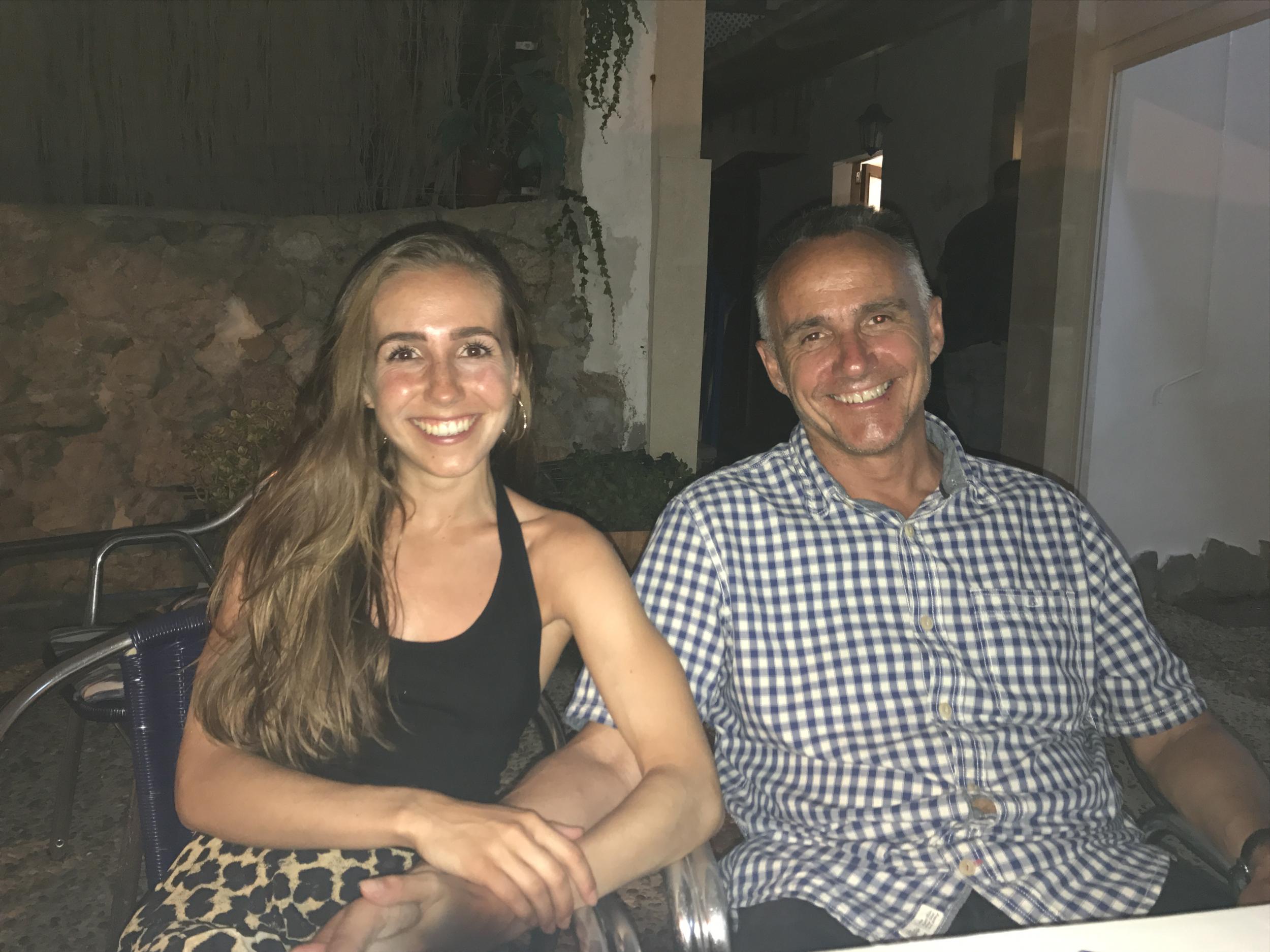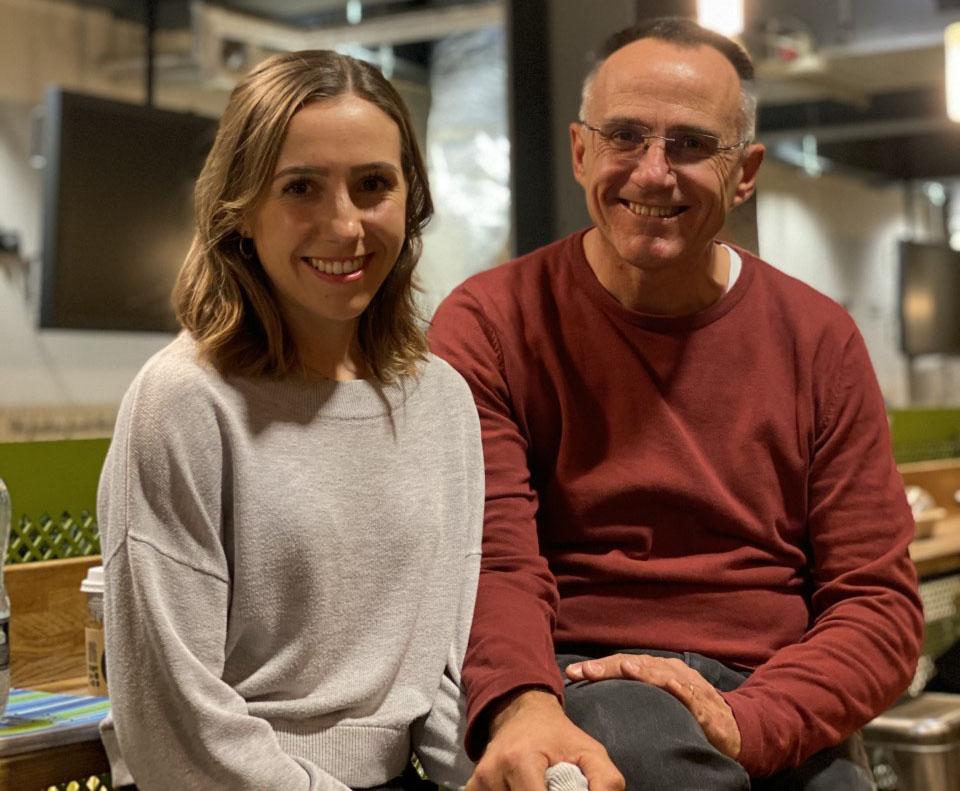The Independent's journalism is supported by our readers. When you purchase through links on our site, we may earn commission.
The right words helped a father save his daughter from anorexia
Mark and Emily’s language of the irrational helped them tackle their personal demons, writes Sam Hancock


When Gogglebox first aired in 2013, it reminded us all that even the most menial of tasks like watching TV – whether it’s the snacks you enjoy while relaxing or the banter you and your family share – looks completely different in every household. Our fascination with the inner workings of other families is the basis for many staples in British culture and has been for some time.
It’s why Jane Austen’s novels still strike a chord with anyone who picks them up, over 200 years after they were written, and it’s presumably why soap operas still have a cult following. “I guess the fact that two out of five of our family has gone a bit... well, crazy... probably means people are going to be interested and connect with it in some way,” Emily Simmonds says, when I meet her and her father, Mark, to discuss their unique journey of breakdown and recovery.
In 2001, after struggling with stress throughout his adult life and then suffering an extended breakdown, Mark drove his bicycle into an oncoming 10-ton truck. Incredibly, he survived – as did the driver – and came away with just a few broken ribs and a punctured lung. Not exactly unscathed, but much better than the intended alternative. More than 10 years later, with Mark now enjoying a stable work and home life, Emily, the second eldest of three children in the Simmonds household, was diagnosed with anorexia nervosa and began a six-year struggle that would eventually see her admitted as an inpatient to an eating disorder clinic, with a feeding tube attached to her stomach through her nose and down her throat.
Mark has since written a book, Breakdown and Repair: A Father’s Tale of Stress and Success, detailing his battles with anxiety, depression and attempted suicide, as well as his role as a father and carer when it came to looking after Emily and ensuring she didn’t let her demons get the better of her.
Sitting with them today, it’s clear their bond is stronger than ever. Mark jokes that the blurb of his book, which says, in perhaps Hollywood-esque fashion: “Mark fought alongside Emily, both lost, both scared, but finding solace in one another” is “a little bit over the top”. Emily disagrees, though, and says it’s not far from the truth – and how “dramatic things really got at times”. Mark concedes: “Yes you’re right”, and I couldn’t agree with them more. Already in this subtle instance of effective communication, the tone for our conversation is set. What I quickly realise is: the reason Mark and Emily have been able to help each other through their darkest days is that they have created their own language of understanding one another. And it is this, they go on to tell me, that saved both of them.
Mark says: “What the book doesn’t quite say but deals with very heavily is the language around mental health: specifically the language of rational and irrational. One of the reasons why Mel, my wife, struggled with both of us being ill was because she speaks the language of rational really well: she’s logical, she’s sensible. Whereas Emily and I are a little bit more intuitive, more emotional, more... whatever you want to call it. And in mental ill-health, the language that comes out isn’t rational. Arguments aren’t rational. It was the difference between telling Emily: ‘If you don’t put on weight, you won’t be able to have kids’ and giving her a hug, telling her that everything was going to be ok... even though I couldn’t be totally sure it was.”

“It was really hard with mum. She couldn’t do the hugging like you could, dad, could she? She was so desperate to make me better that she couldn’t sit there and not say anything – and what she said was normally something to shock me into getting better,” Emily says. “She was trying so hard to help, and that’s what made sense to her. The problem was, the second I felt attacked I would go on the defensive, like a terrier, and it always resulted in me threatening not to eat.”

Throughout the book, Mark details the need to tailor your dealings with someone experiencing mental ill health to how that person best responds to, and understands, the world. Emily is a creative person, so Mark used multicoloured post-its to communicate with her. She also turned to poetry and short stories as a release – two of which feature in the novel and could, on their own, teach the most bewildered person a thing or two about anorexia and depression, or “being in limbo” as Emily so pointedly calls it.
“Imagine communicating with a child,” explains Emily, a comparison I presume dad and daughter have discussed before as Mark nods in agreement from the off. “You wouldn’t talk to them like an adult. You’d change your voice, say simpler things, adapt to their way of understanding. I think what dad means is mental illness requires you, and those around you, to learn and adopt a new language so that you can best try and understand what it is someone’s going through.”
Emily and Mark’s decision to laugh about their past doesn’t mean that they’re conditioned, or covering up sadness, it’s the result of their mutual decision to communicate about what could be a traumatic memory, in a light-hearted and certifiable way
By 2014, though, it seemed no level of communication was going to work. Emily was admitted as a full-time patient to the NHS eating disorder clinic, Cotswold House, weighing just 34.9kg and left with only her mobile phone to communicate with her parents on a daily basis. What followed was six months of diligent and considerate communication between the two. An escape for Emily, whose surroundings weren’t always so promising, and a chance for Mark and Mel to gain an insight into their daughter’s new – and hopefully temporary – life.
In what I’m quickly realising is Mark and Emily’s way of looking at their experiences head-on and giving them the middle finger, they both laugh about the stream of texts – a sea of communication that includes a mix of fairly sad messages as well as more hopeful ones. “There was such a range of messages and you can really see the difference when Em starts getting better – and there weren’t emojis then!” Mark tells me.
“No, Dad, there were – you just didn’t know how to use them.” “Ah yes, if only I’d used an emoji, you might have gotten better quicker!” “[Laughing] Apart from the weird clown faces you’d sometimes send!” “In my defence Em, your texts were so bloody boring, all I could think about was you getting better to send me something interesting again!” We laugh and I realise it doesn’t feel wrong to laugh about such a sad situation – especially when you’re being invited to do so by the people who’ve been through it.
In the recent Joker film, Joaquin Phoenix’s character has a disorder that means he laughs when he’s anxious. He even carries a card around to let people know, in case they become spooked by his random bouts of uncontrollable merriment. I’m reminded of that now, but only because it’s so completely different to this situation. Emily and Mark’s decision to laugh about their past doesn’t mean that they’re conditioned, or covering up sadness, instead it’s the result of their mutual decision to communicate about what could be a traumatic memory, in a light-hearted and certifiable way.

“Do you know what though, even the bit of banter that we’re having now is important. And it doesn’t mean we don’t take what happened seriously, because we do... to both of us, of course we do... but it was really important to have a laugh whenever we could, even when things were at their worst,” Mark says. “And it comes back to that language. It’s about being able to look irrationality in the face and be as irrational as you want right back.”
What strikes me is that Mark and Emily aren’t making a particularly groundbreaking statement: talk about your mental ill health and inquire about others. But within this now overused yet still all-important advice, they’ve managed to go a step further. “This really isn’t just about the importance of talking to someone who’s clearly not well,” Marks says.
"It’s about how to talk to someone. That’s a space largely unexplored in the current conversation around mental health and I’m not saying this will work for everyone – but I hope that Emily and I are proof enough that exploring the tools you can build in order to properly get through to someone who’s not well can make a huge, perhaps even life-changing difference.”
Considering the contentious, often ignorant and usually always flawed, views that exist around suicide, I presume that’s where a lot of Mark’s opinions on this certain kind of language come from. “It’s like when people say suicide is selfish, but what they’re missing is that if you’re at that point your brain isn’t working: the transmitters between your brain cells aren’t talking to one another, and your internal communication is broken down,” he says. “So, there’s no point talking to someone rationally who’s in that state, because they aren’t thinking rationally.”

“Talking is hugely important – and not just talking, but knowing how to talk or at least trying to know how to. You want someone to break down the barrier, to be able to try and get through, because you feel like you can’t do it yourself, so you need someone else to,” says Emily.
“That then gives you the buttons to press and talk about yourself, and say how you’re feeling. It shows that it works but when I moved to London, and joined ITV as a daytime showrunner, I pretended to everyone I was fine. I immediately went backwards and got ill again. It wasn’t until I told them, and they knew how to approach me – which they all did brilliantly – that I could fully immerse myself into that environment and get better, properly.”
Is it not painful reading these messages back, though? “In the clinic, you have set meals six times a day, so you basically spend your day worrying about food before you’ve eaten, worrying about it during and worrying about it after. All you think about is food – it’s an anorexic’s worst nightmare,” Emily says. “If dad hadn’t been there to keep pulling me through it, via these texts, then I know I’d probably still be really poorly.”
Very early on in Mark’s book he makes the point that if you’ve been through any kind of mental ill health, you “join a club” that means you get it, you’re attuned to other people’s suffering and you’re probably more likely to go out of your way to encourage others to talk out and seek help. I think he’s right, but what’s equally important to emphasise – like Mark says now – is that you don’t need to have been to the darkest depths of your brain, or even had a terrible day, to commit to learning how you can better communicate with someone who’s unwell.

When she couldn’t get through to Emily, Mel went to see a psychologist to learn how to communicate with her properly. “It’s not dissimilar from when Margaret Thatcher had to get training to be a people person and learn how to smile, because she couldn’t naturally do it,” Mark says. “You don’t need to have hit rock bottom to get it. You can learn, like Mel did. She wasn’t naturally attuned to it, but she took it upon herself to understand
“Ultimately, it’s common sense: it’s like all communication. If you’re dealing with someone who is ambitious and loves winning, then you don’t talk to them about losing. It’s the same principle, you just have to learn how to do it.” Emily lets out another laugh: “Oops, there he goes again, the mental health practitioner.” “Yup, Dr Mad, that’s me,” Mark, who points out that his Instagram handle actually is @mentalhealthmark, quips.
“I’m sure some people look at us and think: ‘God, that can’t be healthy, having two people who have both been through so many ups and downs supporting each other like they do. What a nightmare...’ but I don’t,” Emily says, when I ask if they feel a newfound pressure to say the right thing and present themselves in a certain way now their story is getting airtime. “We aren’t here to advise on medication, meditation or anything else, really, I’d just be surprised if someone could prove me wrong on saying that talking and communication – in a certain way – is absolutely vital to recovering from mental ill health,” Mark says.
This week, Mark and Emily are hosting an evening in Stewkley, the village where the family lives, to talk about mental health and their experiences with breaking down and building yourself back up. Mark tells me about a man he met while putting up flyers in their local corner shop who asked Mark what he was going to talk about, and if it meant he was able to “cure [his] depression”. Mark laughs and says he wishes it was that easy, but that “really it’s just about ensuring people talk, and opening up the ways they might go about talking” – more than anything else.
Some people may well look at them and think: “God, that can’t be healthy,” but I don’t. Here are two people who, in every sense of the phrase, are living and breathing proof that communication is key to recovering from mental ill health. Sure, Mark and Emily can’t claim to be able to fix someone’s depression, but what they can do is share their story in the hope it makes a difference.
“Breakdown and Repair: A Father’s Tale of Stress and Success” is available to buy on Amazon
If you, or someone you know, is suffering from any form of mental ill health, Time to Change, an online organisation set up by charities Mind and Rethink Mental Illness, is a great place to go for advice on ways to communicate better about mental health
Join our commenting forum
Join thought-provoking conversations, follow other Independent readers and see their replies
Comments
Bookmark popover
Removed from bookmarks